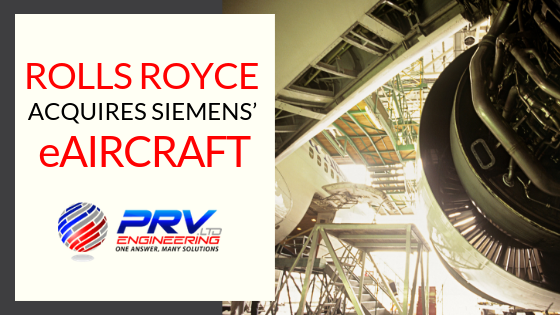
Aviation connects the world by continuously transporting people and goods across the globe in no time at all. While it may appear efficient, climate change has become a clear topic of debate in society due to a concern over plane emissions.
Large manufacturers in aerospace and aviation are investing more in sustainability as emission targets are increasing. A bold move by Rolls-Royce buying the electric aerospace arm of Siemens clearly shows this intent. In fact, this acquisition could speed up electrification in the aviation sector.
A statement by Paul Everitt, chief executive at ADS confirms that, “Manufacturers are investing heavily in new advanced technology that can reduce the carbon emissions from aviation”.
Electrification For Sustainable Aviation
The 2019 Paris Air Show featured many new innovations in the aerospace industry. Among others, the standout was a new Airbus jet rivalling the grounded Boeing 737 Max.
CTOs from Airbus, GE Aviation, Rolls Royce, Safran, UTC, Boeing and Dassault Aviation spoke at the Paris Air Show about setting technological elements in an attempt to hit stringent emissions targets and make the sector more sustainable.
Everitt continued by saying, “The UK’s aerospace sector is committed to playing its part in achieving the target of net zero carbon emissions. The statement from the Chief Technology Officers at seven of the world’s leading aerospace manufacturers shows how seriously this challenge is being taken and the vital technological development already underway to achieve it”.
Rolls-Royce And The eAircraft Business
The eAircraft business which is based in Germany and Hungary, has approximately 180 specialists in electrical design and engineering. They have been working tirelessly to develop a range of all-electric and hybrid electric propulsion systems primarily aimed at the aerospace sector.
Rolls-Royce believes that pure electric or all-electric propulsion will power smaller aircraft in the near future. At the same time, hybrid electric solutions combined with advanced gas turbines will likely power larger aircraft.
According to Rolls-Royce, the electrification of flight is only just one part of their commitment to make aviation more sustainable. They are also working on increasing the fuel efficiency of their gas turbines, developing more environmentally-friendly and sustainable aviation fuels while pursuing the electrification of aviation.
EVTOL Concept From Rolls-Royce
Just a few months ago Rolls-Royce unveiled an impressive EVTOL concept possibly powered by a hybrid system. Reports suggest that it could reach a speed of 300+ mph which makes it the fastest all-electric plane in history. The current record for an electric aircraft is 210 mph held by Siemens back in 2017.
The EVTOL concept apparently has the most energy-dense battery pack ever providing sufficient power to reach a distance of 200 miles on a single charge. The powertrain produces 750 volts and delivers 90% energy efficiency with zero emissions.
For all the full story, read ‘Rolls-Royce Plans World’s Fastest All-Electric Aircraft’.
What Are The Primary Elements For Sustainable Aviation?
The Advisory Council for Aeronautics Research (ACARE) in Europe has set several targets for the aviation industry. They include reducing CO2 emission by 75%, a 90% decrease in NOX and a 65% noise reduction by 2050 in comparison to the year 2000. To meet these ambitious targets, aviation companies must keep the following in mind to become more sustainable:
- Develop aircraft, engine design and technology to improve fuel efficiency while reducing CO2 emissions
- Support sustainable, alternate aviation fuel options
- Develop new aircraft with advanced propulsion systems and technologies to promote the ‘third generation’ of aviation
According to Paul Stein, CTO at Rolls-Royce, “To support the rising demand for air travel while achieving CO2 emissions targets, the aviation industry is developing increasingly environmentally friendly technologies and practices”.
Facing Sustainability Challenges
While we can applaud everyone’s undeniable commitment and continued efforts, it is a big transition for the aerospace sector and it does come with a few major obstacles. Due to the significant challenges there may not be an all-electric powered large commercial aircraft any time soon. Before any of this is possible, battery technology needs to improve considerably in terms of power and weight.
As Everitt states; “What we will likely see first will be electric-hybrid aircraft using both electric motors and traditional jet fuel engines (possibly powered using sustainable aviation fuels) to make substantial efficiencies in fuel use for both passenger and freight aviation”.
Working With PRV Engineering
If you liked this article and want to learn more about engineering, manufacturing and technology, please follow our blog. You can also join the conversation on Twitter, Facebook and LinkedIn. PRV Engineering manufactures for various industries including automotive, aerospace, defence, construction and rail among others. Please get in touch for more information about what we do or if you need help with your engineering project.
This site uses Akismet to reduce spam. Learn how your comment data is processed.


 Mail:
Mail: 




Leave a Comments